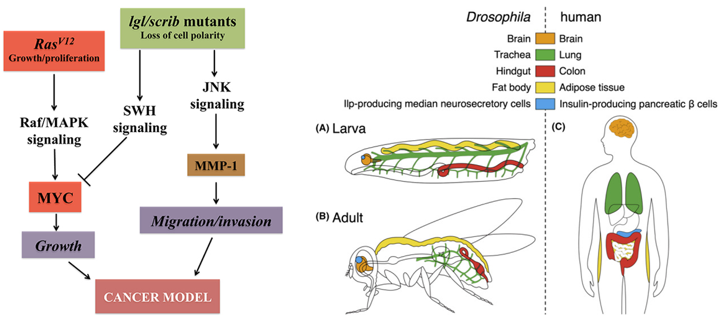Cancer Research Using Drosophila
The cancer burden is increasing globally, making cancer the second leading cause of death in the world. In the past decades, Drosophila models have provided important insights into the underlying mechanisms and heterogeneous metabolism of cancer cells. Here, we present the scientific applications of Drosophila systemic and local models in cancer biology for our global customers.
Introduction of Cancer Modeling in Drosophila
Cancer is a multistep disease, and approximately 90% of human cancers originate in the epithelium. The imaginal disc of Drosophila larvae is a monolayer of epithelium that is limited apically by a squamous epithelium, and by a layer of myoblasts embedded in the extracellular matrix at the bottom, constituting a perfect system to mimic the progression of epithelial cancer development.
Moreover, most of the signaling pathways that control mammalian cell growth and invasion are conserved in Drosophila, allowing scientists to simulate models of tumor biology. For example, by inducing the oncogenic gene Ras (RasV12) or inhibiting the Salvador-Hippo-Warts pathway (SWH), MAPK signaling and Myc proteins can be activated, leading to robust cell growth, thus creating a Drosophila epithelial cell carcinoma model. In addition, the activation of JNK signaling induces the downregulation of metalloproteinase (MMP-1), conferring unique characteristics of epithelial cell migration and invasion.
 Fig.1 Major pathways converging on uncontrolled growth in Drosophila epithelial cells and tissue/organ similarity between Drosophila and human (Mirzoyan et al. 2019, Yamamura et al. 2021)
Fig.1 Major pathways converging on uncontrolled growth in Drosophila epithelial cells and tissue/organ similarity between Drosophila and human (Mirzoyan et al. 2019, Yamamura et al. 2021)Drosophila Application in Cancer Study
- Elucidating the Mechanisms of Cancer
To study the complex mechanisms of cancer, a variety of local and systemic cancer models have been established in Drosophila, including organ-based cancers (intestine, brain, thyroid, lung, colorectal, etc.) and liquid cancers (acute myeloid leukemia, AML). Besides, Drosophila is an important model for studying genetic mechanisms. For example, genetic analysis in Drosophila identified that dlg and scrib interact with lgl to regulate cell polarity, the loss of which occured in approximately 80% of human cancers.
In addition, Drosophila studies identified a process of "cellular competition" to eliminate cells with different characteristics, also present in mammals. It was found that super-competition occurs due to various genetic abnormalities in the Hippo, WNT/Wg and JAK-STAT pathways. In addition to such genetic alterations, environmental factors can affect cellular competition, such as systemic hyperinsulinemia that interferes with scrib mutant cell elimination and promotes tumorigenesis in Drosophila.
- Studying Metabolic Reprogramming in Cancer
Metabolic reprogramming is a key hallmark of malignancy. It has been established that cancer cells exhibit metabolic heterogeneity. Cancer cells reprogram their metabolism to use alternative, less abundant anabolic pathways to maintain their growth. However, metabolic changes in tumors processes make the identification of cancer markers quite complex. Thus, Drosophila is important in the discovery of metabolic vulnerability, intercellular and interorgan communication, as well as anti-cancer drug development and cancer diagnosis. New therapeutic ideas can be facilitated.
To date, in vivo models of Drosophila have been used to study the Warburg effect, mitochondrial metabolism, and the linkages between extrinsic factors (e.g., diet) and cancer. In the future, it could help to identify tumor cell populations with specific metabolic pathways.
 Fig.2 Distinct mitochondrial profiles in fly tumor models (Lam Wong et al. 2021)
Fig.2 Distinct mitochondrial profiles in fly tumor models (Lam Wong et al. 2021)Related Services
CD BioSciences Drosophila Center offers a range of Drosophila-related services to help clients around the world address the genetic and metabolic complexities of cancer. Our technical team has years of experience in identifying, characterizing and validating cancer-associated genes, signaling pathways and metabolic molecules at the cellular level, using a variety of Drosophila models to accelerate our clients' research progress. Our services go beyond this and our techniques go beyond this!
Drosophila Model Customization
Drosophila Metabolism Analysis
Drosophila Proteome Analysis
Our Advantages
-
Professionalism
We have built a professional Drosophila modeling platform and a team with rich neuroscience experience and cutting-edge knowledge to ensure the scientific direction of the project.
-
Personalized Service
We provide one-stop scientific solutions for metabolism and diseases research to accelerate our clients' research speed.
-
Security
We strictly fulfill the confidentiality agreement to protect the privacy of our clients.
-
Effective Price
We insist on win-win situation, providing the most comprehensive and intimate services at the best price.
CD BioSciences is committed to advancing bioscience technology and basic research using Drosophila. With proven technologies and years of experience in the field of fruit fly, our PhD team conducts one-to-one technical consultancy and Drosophila-based integration services to our clients' projects. Please feel free to contact us starting your private project customization.
References
- Mirzoyan Z, et al. (2019). Drosophila melanogaster: a model organism to study cancer. Frontiers in genetics, 10, 51.
- Adesola RO, et al. (2021). Drosophila melanogaster (Meigen, 1830): A Potential Model for Human Diseases. World News of Natural Sciences, 36, 42-59.
- Yamamura R, et al. (2021). Tiny Drosophila makes giant strides in cancer research. Cancer science, 112(2), 505-514.
- Lam Wong KK, et al. (2021). Metabolic reprogramming in cancer: mechanistic insights from Drosophila. Disease Models & Mechanisms, 14(7), 1-17.
For research use only. Not intended for any clinical use.
Related Services
